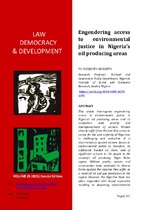Engendering access to environmental justice in Nigeria’s oil producing areas
Abstract
This article interrogates engendering access to environmental justice in Nigeria's oil producing areas and its connection with poverty and disempowerment of women. Women already suffer from the fact that access to justice for the vast majority of Nigerians is challenging and restrictive. It is discriminatory against women. Access to environmental justice is, therefore, an additional burden on them, and of significant concern to the people in the country's oil producing Niger Delta region. Militant youths, women and communities have protested in diverse forms against the injustice they suffer as a result of oil and gas production in the region. However, the Nigerian State has often responded with brutal repression resulting in deepening environmental insult in the region. The oil producing areas, therefore, suffer a triple jeopardy. First, access to justice remains a huge challenge for the people, including women. Secondly, there is the additional burden that they have to struggle for environmental justice against a State and international oil companies that are complicit in the adverse environmental desiderata, a disproportionate brunt of which is borne by women who, however, occupy an auxiliary position in the struggle. Thirdly, where there is policy intervention by way of environmental "clean up" projects, such interventions hardly face up to the need to involve women in developing and implementing key policies, which means that important issues for women are ignored and women continue to suffer substantive environmental injustice.

